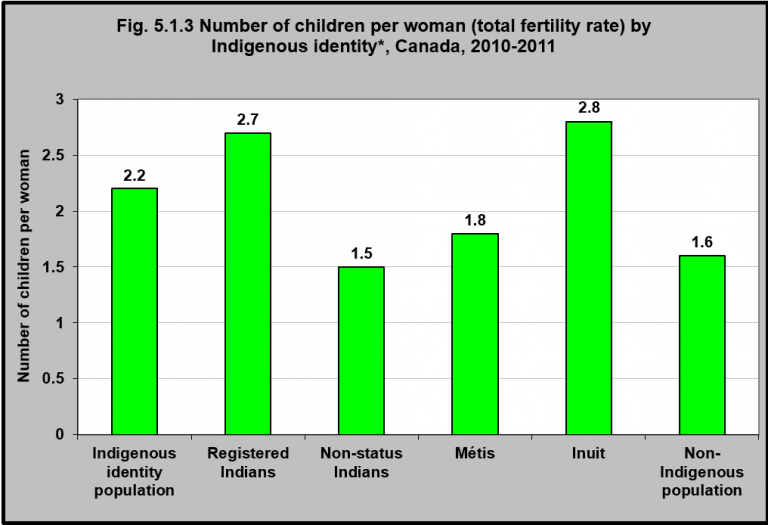Number of children per woman (total fertility rate) by Indigenous identity, Canada, 2010-2011

*The data are classified according to the categories of Indigenous identity as defined by Indigenous and Northern Affairs Canada (INAC).
Source: CICH graphic created using data adapted from Statistics Canada, Demography Division, own-children method applied to the adjusted data of the 2011 National Household Survey (NHS)
http://www.statcan.gc.ca/pub/91-552-x/2015001/t/tbl04-eng.htm – accessed August 22, 2017.
In 2010/2011 the total fertility rate** for Indigenous women* was 2.2 children per woman. This was higher than that of Non-Indigenous women who had a total fertility rate of 1.6 children per woman.
The total fertility rate varied from a low of 1.5 children per woman for Non-Status Indian women to a high of 2.8 children per woman for Inuit women.
**The total fertility rate refers to the number of children that a woman would have over the course of her reproductive life if she experienced the age-specific fertility rates observed in a particular calendar year. It is based on a compilation of the fertility experiences of many different cohorts of women in a given year.1
1Fertility: Overview, 2009 to 2011. Component of Statistics Canada Catalogue no. 91-209-X Report on the Demographic Situation in Canada, 2013. http://www.statcan.gc.ca/pub/91-209-x/2013001/article/11784-eng.pdf
Implications
The higher fertility rate of Indigenous women is one of the contributing factors to the young and rapidly growing Indigenous population. As such, it is important that Indigenous women have access to culturally sensitive maternal and child health services in order to give infants the best start in life and to set them on a healthy pathway. Currently, due to a number of barriers, including geographic isolation, limited resources, lack of personnel, and culture and negative experiences with mainstream health services, many Indigenous women do not receive appropriate pre- and postnatal care or must travel to urban centres, away from the support of their families and communities, to give birth.2 Existing data indicate that Indigenous women have poorer maternal health status and maternity experiences compared to non-Indigenous women, and experience disparities accessing culturally secure maternity care close to home and family.3 Health services, programs and policy responses tailored to Indigenous communities could improve maternity services for Indigenous women and improve health outcomes and enhance the well-being of both mother and child.
2Lalonde, A.B., Butt, C., & Bucio, A. (2009). Maternal health in Canadian Aboriginal communities: Challenges and opportunities. Journal of Obstetricians and Gynaecologists of Canada, 31(10), 956-962;
3Smylie, J. (2014). Strong women, strong nations: Aboriginal maternal health in British Columbia. Prince George, BC: National Collaborating Centre for Aboriginal Health.
